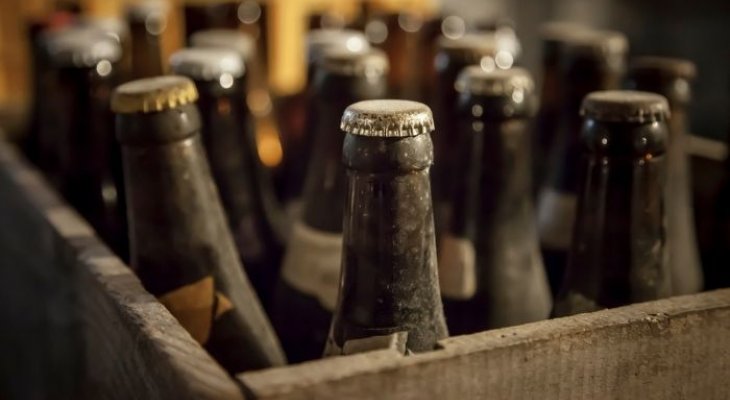Can You Still Drink It? How Long Does A Beer Really Last?

There’s nothing like a cold, crisp beer to finish off the day.
That’s what I was thinking when I opened my fridge to find that the only beer I had left had been in there for months. Naturally, I had my doubts. The expiration date said I shouldn’t drink it, but I wouldn’t just give up on her so easily.
How long does beer last? Generally speaking, beer can last anywhere from 6 to 9 months when stored at room temperature—and up to two years if left in the fridge. This is true even if the beer has already exceeded its printed “sell-by” date.
I was able to enjoy my ice-cold beer, after all!
In this guide, I’ll go over everything there is to know about beer and its expiration dates, including storage tips that are vital to keeping your beer fresh.
Does Beer Expire?
If you’ve got old beer sitting around the fridge like I did, you may be wondering the same thing I was: does beer expire? If so, when? The short answer is that, even though beer does expire, there’s no set date as to when. Instead, you can expect your beer to be good within a set range based off the conditions you stored it in.
Your beer will expire quicker if you store it outside the fridge (particularly if you store it in warm or hot environments).
Conversely, it could last for years if stored in the fridge.
Coming up, we’ll take a look at why beer goes bad and its specific shelf-life ranges under different storage methods.
Why Does Beer Go Bad?
All good things must come to an end—including your beer. The important question is “why.”
What makes your beer go from those crisp sips of paradise to stale and sickening? The answer is actually pretty simple.
Beer goes bad when overexposed to two common elements:
Light
Ever heard of a “skunked” beer? Also known as “lightstruck,” these beers have a particular skunk-like aroma that results from the chemical changes induced by UV (or fluorescent) light on a beer’s alpha acids. Overexposure to this kind of light can cause a beer to skunk before its time, giving it a foul taste and an even worse smell.
This is particularly true if the beer is left in the heat, which can cause adverse chemical reactions that affect taste.
Oxygen
Even if beer is stored in the coldest, darkest of places, it will still eventually go bad through the process of oxidation. This occurs when molecules in the beer itself undergo chemical changes that make it taste “stale” and “cardboard-like.”
Oxidized beer can also taste and smell like honey or lipstick, neither of which sound particularly appealing after a long day at work.
Factors That Increase a Beer’s Chances of Becoming Skunked or Oxidized:
Turnover
Do you like more “obscure” beer brands? If so, there’s a chance that it’s not selling out as quickly.
More time spent on the shelf means more time this beer will have to oxidize and become lightstruck.
Packaging
Cans act as natural barriers to UV radiation and also slow the oxidation process. For this reason, they generally last the longest, though brown beer bottles also have a leg up on the rest of the competition.
In general, clear beer bottles do little to protect the contents from reacting to light.
Distance traveled
Heat and motion both work to induce oxidation among beer molecules. Therefore, beer that’s traveled a long distance will inevitably be further along in the oxidation process.
How Long Does Beer Last in the Fridge?
There’s no better place for your beer than the fridge. Cold and dark, these machines act to block out unwanted light and to slow the oxidation process. Because of this, beer can last up to two years in the fridge, which is actually pretty incredible.
TIP: Don’t freeze your beer to make it last longer.
When frozen, the carbon dioxide in your can or bottle will rush forward and cause the product to explode. Even in less dramatic scenarios, you can expect this expansion to introduce oxygen from outside into the container, causing your beer to oxidize and go stale.
For this reason, make sure you stick to simply chilling your beer and not freezing it (unless you’re going to take it out within a few minutes).
How Long Does Beer Last Outside the Fridge?
How long beer lasts outside the fridge depends on where you put it.
As I mentioned before, the general rule is that beer can last between six and nine months past its sell-by date when stored outside of the fridge. In reality, however, this figure depends on a variety of factors.
If you store your beer somewhere hot or overexposed to light, for instance, you can expect it to go bad relatively quickly. If you’re out of space in your fridge and need to store beer, consider putting it somewhere dark and cold, such as a basement.
How Do You Know When Beer Goes Bad?
The simple answer to this question is: you will know it when you see it. The moment you smell a skunked or oxidized beer, you will know something is wrong. Still, it’s important to know what to look for in a beer that’s gone bad.
Specifically, old beer will:
Smell
In the best-case scenario, you can expect an old beer to smell sweet like lipstick or honey. If the beer has skunked, however, be prepared for a smell that, as the name implies, isn’t wholly unlike the spray of a skunk.
Obviously, if your beer smells like a wild animal, it’s not fit to drink.
Have a Foul Taste
Another obvious indication is a foul taste. Skunked beer can taste down-right spoiled, and even simple oxidized beer will have a flat taste. Generally speaking, this taste is akin to paper or cardboard and won’t have any of the crispness that you’ve come to expect from your beer.
Be Off-Color
Does your beer look a little funny? It could be old. One defining characteristic of old beer is a change in color. If your beer is several shades darker (a result of the oxidation process wherein your beer loses yeast), you can bet that it will taste off, too.
You may even notice “dust-like” settlement at the bottom of your bottle, which is a result of the oxidation process.
3 Easy Beer Storage Tips
For longer-lasting, better-tasting beer, proper storage is the key. Make sure to keep these 3 following storage tips in mind if you want to extend the shelf-life of your beer:
#1 Leave It in the Dark
One reason why refrigerators are so great at storing beer is because they are dark until the door is opened. If you need another place to store your beer, you’ll want to find somewhere just as dark, whether that be a cupboard, your pantry, or your basement.
#2 Store It Upright
Storing your beer upright slows down the oxidation process. Therefore, be sure to keep your cans or bottles straight and not on their sides if you want to keep them as fresh as possible.
#3 Optimize Your Storage Temperature
While simply sticking your beer in the fridge is probably good enough (especially if you plan on drinking it soon, anyway), there’s actually more you can do to make sure your beer stays fresh and crisp. Specifically, you can optimize storage temperature based off the delicacy of your beer.
Here’s how it works:
- Lighter beers should be kept in an environment between 45-50 degrees Fahrenheit.
- For mildly stronger beers, up the temperature by five degrees on either end (50-55 degrees Fahrenheit).
- Strong, burly beers require an even higher temperature (between 55-60 degrees Fahrenheit).
The stronger the alcohol content, the less need for extremely cold storage.
Lighter beers don’t age as well as stronger ones and should be stored more carefully and consumed more quickly as a result.
Differences in Shelf-Life Depending on Type of Beer
We’ve touched on this a little bit already.
As a rule of thumb, the stronger the beer, the longer the shelf-life (and vice versa). This is because lighter beers have less to oxidize and can therefore be made flat more quickly.
Let’s take a look at a more comprehensive breakdown of this phenomenon:
Light Beers
Light beers such as wheat beers and lagers have the shortest shelf-life. Even with proper storage, you’ll want to consume these beers within four to six months. The same goes for any beer that is light or delicate of flavor, including farmhouse ales and fresh hop IPAs.
Mild Beers
Beers such as stouts, porters, IPAS, amber ales, and bitters can be stored for six to nine months without issue.
Strong Beers
The strongest beers can be stored for more than nine months. In fact, some, such as barleywines, even get better with age. Other beers in the long-term storage category include high gravity beers and old or dark ales.
Bottom Line
No one likes throwing away beer. Fortunately, you may not have to.
If your beer has been properly stored, you can still drink it for months and years after the expiration date. This guide provides a comprehensive overview of beer storage and answers the question “How long does beer last?” so that you can keep your beer fresh for as long as possible.
Have questions about your beer?
Make this your comprehensive guide on storing and consuming aged beer so you never run into trouble again!



